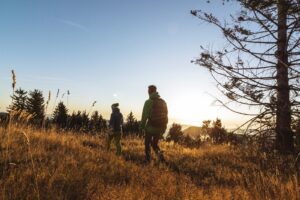Hunting is a recreational activity that has been a part of human culture for thousands of years.
Historically, hunting was necessary for survival and provided an important source of food for communities.
However, as society has evolved, hunting has become less of a necessity and more of a leisure activity.
Despite its importance in human history, hunting has become a controversial topic in recent years.
While some view it as a way to connect with nature and enjoy the outdoors, others argue that it is cruel and unnecessary.
It is important to consider both the positive and negative aspects of hunting in order to form a balanced understanding of the practice.
This article will explore the pros and cons of hunting in detail, with the goal of providing a comprehensive understanding of the topic.
Before delving into the pros and cons of hunting, it is important to understand the historical and cultural significance of the practice.
Historical Significance

Hunting has played a crucial role in human history, serving as a source of food, clothing, and shelter for our ancestors.
In prehistoric times, hunting was necessary for survival, as humans had not yet developed agriculture or domesticated animals.
Over time, hunting became more than just a necessity; it also became a cultural and social activity.
Hunting was often associated with social status and was used as a way to bond with others.
Current State of Hunting
Today, hunting is still practiced around the world.
In many countries, hunting is regulated by laws and regulations to protect wildlife and ensure that it is carried out in a safe and ethical manner.
However, the practice of hunting has become increasingly controversial in recent years, with many arguing that it is unnecessary and cruel.
Others, however, see hunting as a way to connect with nature and enjoy the outdoors.
Purpose of the Article
The purpose of this article is to present both the benefits and drawbacks of hunting.
By exploring the pros and cons of hunting in detail, readers will gain a comprehensive understanding of the topic.
This article is not meant to persuade readers to take a particular stance on hunting.
Rather, its goal is to provide a balanced analysis of the practice, with the hope that readers will be better informed and equipped to make their own decisions about hunting.
Pros of Hunting
Hunting is a recreational activity that has been around for centuries.
It involves pursuing wild game and taking it down for various purposes.
While some people may view hunting as unethical or unnecessary, others believe it to be a beneficial activity for both humans and wildlife.
In this section, we will explore the various pros of hunting and the ways in which it can positively impact our lives and the environment.
Controls wildlife populations
One of the most significant benefits of hunting is its ability to control wildlife populations.
In areas where hunting is allowed, game populations are often kept in check, preventing overpopulation that can lead to environmental damage and disease.
By keeping animal populations at healthy levels, hunting helps to maintain a natural balance in ecosystems and protect endangered species.
Safe recreational activity
Hunting is a recreational activity that can be done safely.
When hunters follow the proper safety guidelines, including wearing bright clothing, checking their firearms, and being aware of their surroundings, the risk of injury is greatly reduced.
Additionally, hunting can be done with a group of friends or family members, making it a fun and social activity.
Improves personal fitness
Hunting requires physical activity, including hiking, tracking, and carrying equipment.
This physical activity can improve personal fitness by providing cardiovascular exercise, building strength, and improving balance and coordination.
Hunting also provides an opportunity to get outside and enjoy the fresh air and natural surroundings.

Increases knowledge of nature
Hunting provides a unique opportunity to learn about nature and the environment.
Through observation and experience, hunters can gain a deeper understanding of the natural world, including animal behavior, habitat, and the interconnectivity of ecosystems.
This knowledge can lead to a greater appreciation for nature and a desire to protect it.
Provides a source of food
Hunting provides a source of food for individuals and families.
By hunting their own game, hunters can ensure that they have access to fresh, organic meat.
Hunting also promotes self-sufficiency and independence by providing an alternative to store-bought meat.
Generates revenue
Hunting generates revenue for local economies through the sale of hunting licenses, equipment, and other related products and services.
This revenue can be used to fund conservation efforts, maintain wildlife habitats, and support rural communities.
Reduces automotive accidents
Wildlife-vehicle collisions are a significant problem on roads and highways, causing property damage, injury, and loss of life.
By hunting and managing animal populations, hunters can help reduce the number of wildlife-vehicle collisions, making roads safer for drivers and animals alike.
Promotes sport and competition
Hunting is often seen as a sport, with hunters competing to take down the biggest and best game.
This competitive aspect of hunting can be a source of enjoyment and motivation for hunters, pushing them to improve their skills and techniques.

Regulates animal populations
Hunting helps to regulate animal populations, preventing overpopulation that can lead to environmental damage and disease.
By keeping animal populations at healthy levels, hunting helps to maintain a natural balance in ecosystems and protect endangered species.
Enhances hunting skills
Hunting requires a unique set of skills, including tracking, stalking, and marksmanship.
Through practice and experience, hunters can improve their hunting skills, making them more effective and efficient in the field.
Connects people with nature
Hunting provides an opportunity to connect with nature and the environment in a meaningful way.
By spending time outdoors, observing wildlife, and appreciating the beauty of natural landscapes, hunters can develop a deeper sense of connection and appreciation for the natural world.
Reduces stress levels
Spending time in nature has been shown to reduce stress levels and improve overall well-being.
Hunting provides an opportunity to disconnect from the stresses of daily life and enjoy the peace and solitude of the outdoors.
Reconnects with ancestral roots
Hunting has been a part of human history for thousands of years, and for many people, it is a way to reconnect with their ancestral roots.
By participating in a tradition that has been passed down through generations, hunters can gain a sense of connection to their ancestors and cultural heritage.
Develops patience
Hunting requires a great deal of patience and persistence.
It can take hours, or even days, to track and take down game.
By practicing patience and perseverance, hunters can develop important life skills that can be applied to other areas of their lives.
Ensures a sustainable food source
Hunting provides a sustainable food source that is free from hormones, antibiotics, and other additives commonly found in store-bought meat.
By hunting their own game, hunters can ensure that the meat they consume is fresh, healthy, and free from harmful chemicals.
Enhances appreciation for meat
By hunting their own game, hunters develop a deeper appreciation for meat and the effort that goes into obtaining it.
This appreciation can lead to a greater respect for the animals and a desire to use all parts of the animal, reducing waste and promoting sustainable practices.

Improves physical abilities
Hunting requires physical fitness and mental acuity.
By engaging in physical activity, hunters can improve their cardiovascular health, build strength, and improve balance and coordination.
Hunting also requires mental focus and sharpness, which can improve cognitive function.
Sharpens senses
Hunting requires keen senses, including sight, sound, and smell.
By practicing their hunting skills, hunters can sharpen their senses, making them more attuned to the natural world and better able to perceive their surroundings.
Builds character and discipline
Hunting requires discipline, patience, and respect for nature and wildlife.
By practicing these values, hunters can develop important character traits, such as self-control, responsibility, and humility.
Teaches about ecosystems
Hunting provides an opportunity to learn about ecosystems and the interconnectivity of all living things.
By observing wildlife and their habitats, hunters can gain a deeper understanding of the natural world and the importance of protecting it.
Manages wildlife populations
Hunting helps to manage wildlife populations, preventing overpopulation that can lead to environmental damage and disease.
By keeping animal populations at healthy levels, hunting helps to maintain a natural balance in ecosystems and protect endangered species.
Provides high-quality meat
Hunting provides access to high-quality meat that is free from hormones, antibiotics, and other additives commonly found in store-bought meat.
By hunting their own game, hunters can ensure that the meat they consume is fresh, healthy, and free from harmful chemicals.

Promotes ethical treatment of animals
Hunting promotes ethical treatment of animals by ensuring that they are killed quickly and humanely.
Hunters are also encouraged to use all parts of the animal, reducing waste and promoting sustainability.
Prevents vehicle collisions
Hunting and managing animal populations can help prevent wildlife-vehicle collisions, which can cause property damage, injury, and loss of life.
By keeping animal populations at healthy levels, hunters can reduce the number of animals on the roadways, making them safer for drivers and animals alike.
Supports livelihoods
Hunting can be an important source of income for many people, including guides, outfitters, and other related businesses.
By supporting these livelihoods, hunting can help to promote economic growth and development in rural communities.
Cons of Hunting
While hunting has its benefits, it also has its drawbacks.
Some people view hunting as cruel or unnecessary, while others criticize it for its potential negative impact on the environment.
In this section, we will explore the various cons of hunting and the ways in which it can negatively impact our lives and the environment.
Legal restrictions
Hunting is subject to numerous legal restrictions, including hunting seasons, bag limits, and firearm restrictions.
These restrictions can limit the availability of hunting opportunities and make it difficult for some people to participate in the activity.
Steep learning curve
Hunting can take a long time to learn, requiring knowledge of animal behavior, habitat, and tracking techniques.
This learning curve can be steep, making it difficult for some people to get started in the activity.
Expensive hobby
Hunting can be a costly hobby, requiring the purchase of equipment, licenses, and other related expenses.
For some people, these costs may be prohibitive, limiting their ability to participate in the activity.
Access to hunting areas
Hunting requires access to hunting areas, which may be limited in some areas.
This can make it difficult for some people to participate in the activity, especially in urban areas or areas without public land.
Risky activity
Hunting can be a risky activity, with the potential for accidents or injury.
While the risk of injury can be minimized by following proper safety guidelines, there is always a risk involved when handling firearms and pursuing wild game.
Animal carcass handling
Hunting requires the handling of animal carcasses, which can be messy and unpleasant.
Some people may find the process of cleaning and processing game to be unpleasant or unappetizing.
Overhunting threatens species
Overhunting can be a problem in some areas, leading to population declines and threats to endangered species.
When hunters take too many animals from a population, it can disrupt the natural balance and lead to environmental damage.
Traps and game pits harm wildlife
Game pits and traps can be harmful to wildlife, causing injury or death.
While these practices are often used to manage animal populations, they can also harm non-target species or disrupt natural ecosystems.
Requires good vision
Hunting requires good vision, making it difficult for some people with poor eyesight to participate in the activity.
This can limit the accessibility of hunting opportunities for some individuals.
Hunted animals can carry diseases
Hunted animals can carry diseases, including chronic wasting disease, which can be transmitted to humans.
While the risk of disease transmission is low, it is important for hunters to take proper precautions when handling game.
Trophy hunting unethical
Trophy hunting, or hunting for sport rather than for food, is often viewed as unethical by many people.
This type of hunting can result in the unnecessary killing of animals and can contribute to population declines.
Endangers species
While hunting can be used to manage wildlife populations, it can also contribute to the endangerment of species.
When hunting is done in an unsustainable way or without proper management, it can lead to population declines and threats to biodiversity.

Lack of knowledge among hunters
Many hunters have insufficient knowledge about wildlife management, biology, and ecology.
This can lead to poor hunting practices, overhunting, and other negative impacts on the environment.
Not suitable for sensitive people
Hunting can be a violent and bloody activity, which may be unsuitable for some people, especially those who are sensitive to the suffering of animals.
Conflicts with ethics of some
Hunting conflicts with the ethics of some people, who view killing animals as unnecessary or cruel.
This can lead to social conflicts and disagreements between hunters and non-hunters.
Potential fines and penalties
Hunting violations can result in fines, penalties, or even criminal charges.
Can lead to abusive practices
Hunting can lead to abusive practices, including poaching, trapping, and illegal hunting.
These practices can have negative impacts on wildlife populations and contribute to environmental damage.
May cause suffering to animals
While hunting is often viewed as a quick and humane method of killing animals, there is the potential for animals to suffer if they are not killed quickly and effectively.
This can be distressing for both hunters and animals.
Can be cost-prohibitive
Hunting can be a costly activity, requiring the purchase of equipment, licenses, and other related expenses.
For some people, these costs may be prohibitive, limiting their ability to participate in the activity.
Controversial activity
Hunting is a controversial activity, with many people expressing strong opinions both for and against the practice.
This controversy can lead to social conflicts and disagreements between hunters and non-hunters.
Limited availability of hunting areas
Hunting areas may be limited in some areas, making it difficult for hunters to find places to hunt.
This can limit the accessibility of hunting opportunities for some individuals.
Seasonal restrictions
Hunting is often subject to seasonal restrictions, limiting the availability of hunting opportunities throughout the year.
This can make it difficult for some people to participate in the activity.
Requires time and effort
Hunting requires a significant amount of time and effort, including tracking, stalking, and processing game.
For some people, this may be a barrier to participation in the activity.
Possibility of accidents
Hunting can be a risky activity, with the potential for accidents or injury.
While the risk of injury can be minimized by following proper safety guidelines, there is always a risk involved when handling firearms and pursuing wild game.
Can create conflicts between hunters and non-hunters
Hunting can create conflicts between hunters and non-hunters, who may view the activity as cruel or unnecessary.
This can lead to social conflicts and disagreements between different groups.
Conclusion
Hunting is a complex issue that elicits a range of opinions and emotions from people.
While there are some benefits to hunting, such as controlling wildlife populations, providing a source of food, and generating revenue, there are also potential drawbacks, such as the risk of animal cruelty, the impact on ecosystems, and the potential for accidents and ethical conflicts.
One of the key advantages of hunting is that it can help regulate animal populations.
When animals are overpopulated, they can cause damage to the environment and even pose a threat to human safety.
Hunting can help control these populations and prevent such incidents from occurring.
Hunting can also provide a source of food for individuals and families, especially in rural areas where access to fresh meat may be limited.
This can be a more sustainable and ethical way of obtaining meat compared to factory farming.
Additionally, hunting can help people connect with nature, build physical and mental strength, and gain a deeper appreciation for the environment.
Hunting requires patience, discipline, and skill, and can be a rewarding experience for those who take part in it.
Furthermore, hunting can be a source of revenue for communities and can support local economies.
However, there are also potential drawbacks to hunting.
Hunting can be a dangerous activity, and individuals who are not properly trained or who engage in unethical practices can put themselves and others at risk.
Furthermore, overhunting can lead to imbalances in ecosystems and threaten the survival of certain species.
Hunting can also be a controversial activity, with many people holding strong opinions on its ethics and legality.
In conclusion, the pros and cons of hunting are varied and complex, and it is up to individuals and communities to weigh these factors and decide whether hunting is a viable activity for them.
While hunting can have benefits such as controlling animal populations, providing a source of food, and connecting people with nature, it is important to also consider the potential drawbacks, including ethical conflicts, safety concerns, and the impact on ecosystems.
Ultimately, whether or not to hunt is a decision that should be made with careful consideration of all factors involved.
Resources
https://www.dec.ny.gov/outdoor/hunting.html
https://www.fws.gov/hunting/map
https://wildlife.ca.gov/Hunting
https://dnr.wisconsin.gov/topic/Hunt
https://tpwd.texas.gov/huntwild/hunt/
https://fwp.mt.gov/hunt/regulations
https://www.fs.usda.gov/visit/know-before-you-go/hunting
https://www.michigan.gov/dnr/things-to-do/hunting
https://www.maine.gov/ifw/hunting-trapping/index.html
https://en.wikipedia.org/wiki/Hunting
https://www.ncwildlife.org/hunting/hunting-in-north-carolina